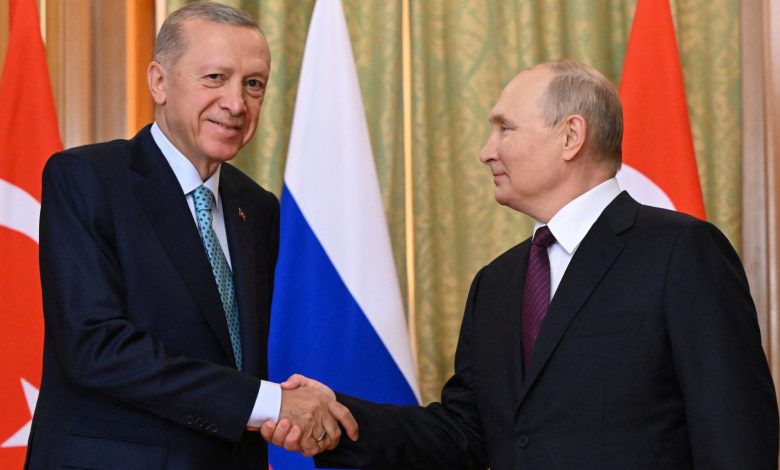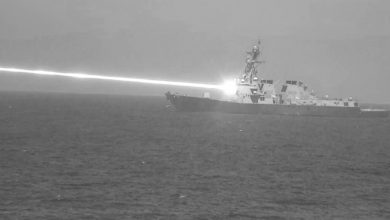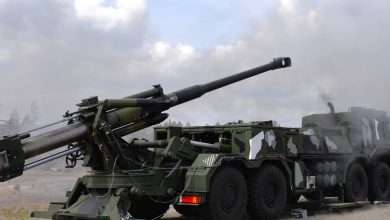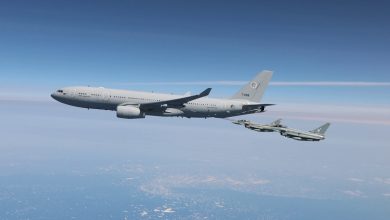Erdoğan-Putin meeting ensures free grain deal to African nations

Russian President Vladimir Putin on Monday said Moscow was close to finalizing an agreement that would facilitate free exports of grain from Russia to six African nations with the help of Türkiye and Qatar, stressing the proposal was not planned as an alternative to the Black Sea initiative.
“We are close to completing agreements with six African states, where we intend to supply foodstuffs for free and even carry out delivery and logistics for free,” Putin told a news conference alongside President Recep Tayyip Erdoğan in the Black Sea resort of Sochi. “Deliveries will begin in the next couple of weeks.”
The deal would include a supply of up to 1 million metric tons of grain to countries most in need via Türkiye with financial support from Qatar, the Russian leader said. The grain will be sent for subsequent processing at Turkish plants before being shipped to the African nations.
Erdoğan’s visit to Sochi on Monday came more than one month after Moscow put on hold a key agreement that allowed Ukraine to export grain and other commodities from three Black Sea ports despite the 18-month war.
Brokered by Türkiye and the U.N., the deal was seen as vital for global food supplies, especially in Africa, the Middle East and Asia. Ukraine and Russia are major suppliers of wheat, barley, sunflower oil and other goods that developing nations rely on.
Russia put the deal on hold, complaining that a parallel deal promising to remove obstacles to Russian exports of food and fertilizer hadn’t been honored and that not enough Ukrainian grain was going to countries in need. It said restrictions on shipping and insurance hampered its agricultural trade even though it has shipped record amounts of wheat since last year.
Putin on Monday stressed Russia’s readiness for talks on the grain initiative but reiterated that there will be no new deal on shipping through the Black Sea until the West meets its obligations to facilitate Russian agricultural exports.
“We will be ready to consider the possibility of reviving the grain deal,” he said. “And we will do it as soon as all the agreements on lifting restrictions on Russian agricultural exports are fully implemented.”
Both Ukraine and Russia have aired rival plans to start sending grain across the Black Sea on their own.
Ukraine last month announced a new temporary sea corridor through which it has already sent four cargo ships.
Having been trying to revive the agreement and use it as a basis for broader peace talks, Erdoğan said that Ankara was against alternative proposals to last year’s Ukraine grain deal.
“The alternative proposals brought to the agenda could not offer a sustainable, secure and permanent model based on cooperation between the parties like the Black Sea Initiative,” he said.
He said the grain deal plays “a key role in the global food crisis,” and that it serves as “a lifeline” for people in need, particularly those in Africa.
Erdoğan remains optimistic as he said he still believes a solution can be found soon to revive the grain deal, including filling the remaining gaps.
He said Türkiye and the United Nations had prepared new proposals aimed at addressing Russia’s problems with the deal, adding that he hoped to reach a workable solution “soon.”
“We believe that the initiative should be continued by eliminating its shortcomings,” Erdoğan noted.
“In this context, we have prepared a new proposal package in consultation with the U.N. I believe that it is possible to get results. I believe that a solution that will meet Türkiye’s expectations will be reached soon.”
Since Moscow withdrew from the grain initiative, Erdoğan has repeatedly pledged to renew arrangements that helped avoid a food crisis in parts of Africa, the Middle East and Asia.
The trip to the Black Sea resort city marks a rare visit by a leader of a NATO country to Russia amid Moscow’s all-out war in Ukraine.
But Erdoğan has taken on the role of mediator between Ukraine and Russia and has been one of the few leaders within the NATO alliance to maintain open access to Putin.
Growing ties
Monday’s talks mark the first meeting between the two leaders since Erdoğan’s reelection for a third term as president in May.
Erdoğan was accompanied by a large delegation that included Türkiye’s defense, foreign, energy and finance ministers.
Türkiye and Russia have enjoyed growing ties in several areas, including energy.
Erdoğan said his government wanted to boost annual trade with Russia to $100 billion from $62 billion, adding that he supported Moscow’s push to switch a part of that trade into Turkish liras and rubles.
“I believe that switching to local currencies is extremely important in bilateral relations,” he said.
For his part, Putin said the two leaders had raised relations between the two countries to a “very good, high level.”
He mentioned various areas of bilateral cooperation, such as a proposed Russian gas hub in Türkiye and the construction of the first nuclear power plant, Akkuyu, in which Moscow is actively involved.
He also said he hoped they would wrap up talks soon on creating a hub in Türkiye for exports of Russian gas.
Türkiye has positioned itself to facilitate any peace talks between Ukraine and Russia. It has opposed the Russian invasion but also the Western sanctions on Moscow.
Erdoğan, who previously played a significant role in convincing Putin to stick with the grain deal, has maintained good relations with Putin and helped broker prisoner exchanges between the warring sides.
The Turkish leader has repeatedly called on the Western countries to consider Russia’s demands and said he hoped his talks with Putin could lead to the restoration of the Black Sea Grain Initiative.
The Sochi summit follows last week’s talks between Turkish Foreign Minister Hakan Fidan and his Russian counterpart Sergei Lavrov and Defense Minister Sergei Shoigu, during which Russia handed over a list of actions that the West would have to take in order for Ukraine’s Black Sea exports to resume.
Shoigu said it was not Russia’s fault that the grain deal had failed and repeated the Russian position that Moscow would return to it if all the promises made to Russia were fulfilled.
“It’s not our fault today, but it’s stopped,” Shoigu said in a statement released by the Defense Ministry. “Here we can say only one thing, that if everything that was promised to Russia is fulfilled, the deal will be extended.”
“It turned out that it is more difficult to do this than to build new corridors, new ground routes,” said Shoigu, who attended the signing ceremony for the Black Sea deal in Istanbul in 2022.
The Black Sea grain deal was intended to combat a global food crisis that the U.N. said had been worsened by Russia’s full-scale invasion of Ukraine in February 2022, which Russia calls a “special military operation.”
Moves to revive grain deal
Moves are afoot to revive the deal.
U.N. Secretary-General Antonio Guterres said on Thursday that he had sent Lavrov “a set of concrete proposals” aimed at reviving a deal that allowed the safe export of Ukrainian grain via the Black Sea.
Türkiye’s Fidan said at a briefing in Moscow on Thursday that reviving the deal was important for the world.
U.S. wheat prices rose on Friday, though Lavrov said on Thursday that Russia saw no sign that it would receive the guarantees needed to revive the grain deal.
Lavrov said the West was hyping the talk of a global food crisis as prices remained around 2021 levels and had ignored Putin’s pledge to supply Burkina Faso, Zimbabwe, Mali, Somalia, the Central African Republic and Eritrea with up to 50,000 tons of grain each free of charge.
To convince Moscow to approve the original deal, known by diplomats as the Black Sea Grain Initiative, a three-year accord was struck at the same time under which U.N. officials agreed to help Russia with its own food and fertilizer exports.
But Moscow said that the memorandum had not been honored due to the perfidy of the West.
One of Moscow’s main demands is for the Russian Agricultural Bank to be reconnected to the SWIFT international payments system. The EU cut it off in June 2022.
While Russian exports of food and fertilizer are not subject to Western sanctions imposed after Russia’s invasion, Moscow has said restrictions on payments, logistics and insurance have hindered shipments.
Since putting the deal on hold, Russia has ramped up drone and missile attacks on Ukrainian grain ports and storage infrastructure. Ukraine says tens of thousands of tons of grain have also been destroyed in the process.





